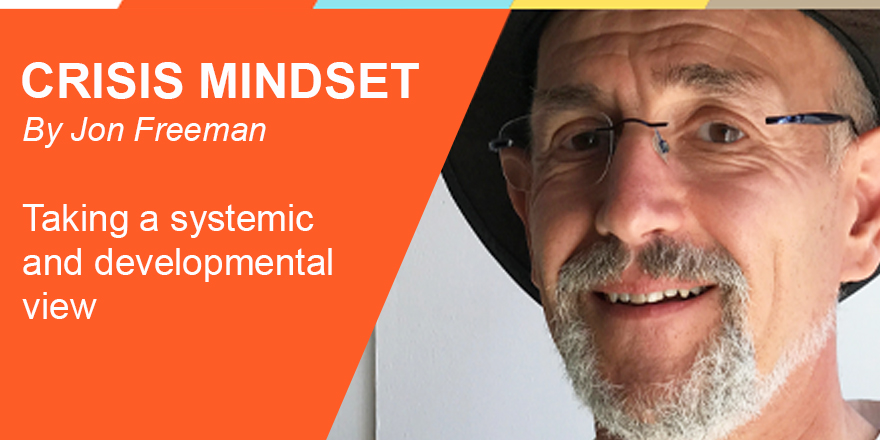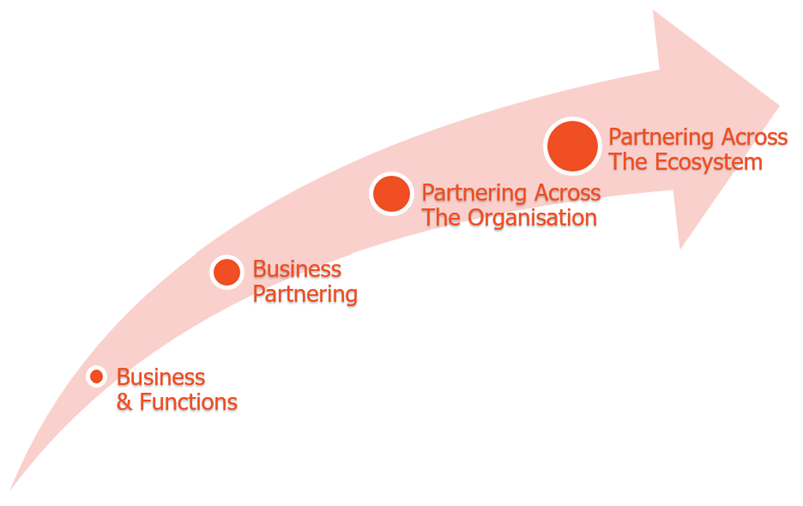

In today’s interconnected business landscape, the ability to forge strong and collaborative relationships both within and outside the organisation is more than just a valuable skill—it’s a critical asset for growth, innovation, and success. Despite its importance, many businesses struggle to cultivate these essential relationships. Our decade-long experience from client partnerships and research have led us to develop an Organisational Partnering Maturity model. This identifies four stages of maturity, each with unique characteristics and challenges to help you think about what might be needed for you to advance your organisation’s partnering capabilities to the level needed.
Where do you stand today and where do you think you need to move to for the sustained health of your business?

1. Business & Functions: The Initial Stage
At this foundational level, the focus is predominantly inward. Functions within the organisation operate in silos, primarily focusing on their own needs rather than the collective goals of the organisation.
Characteristics: Functions respond reactively to business requests, ensuring that standards and policies are adhered to. The business seeks functional support to meet their immediate needs and while functions are valued for their subject matter expertise the business ultimately makes the final decisions.
Challenges: Tensions arise from misaligned priorities and a limited understanding between the business and functions, and functions can appear as blockers rather than enablers. The functions are often viewed as functional police, with the value they could add not being understood or leveraged by the business.
2. Business Partnering: Developing Integration
As organisations progress, business partners play a pivotal role in bridging the gap between functions and business needs, fostering a more integrated approach.
Characteristics: Transitioning from functional experts to strategic influencers, business partners leverage their detailed expertise and business acumen to create value for the business. Business partners build and maintain critical stakeholder relationships, establishing trust and facilitating collaboration. This enhances their influence, enabling them to guide and integrate functional insights into business strategies effectively.
Challenges: There remains a challenge for functions to fully understanding business strategy, especially in complex scenarios. This can result in a responsiveness gap, where functions struggle to adapt quickly enough to provide timely and relevant support to the business. A siloed mindset may continue to prevail and this can lead to ongoing frustration that functions lack sufficient influence to effectively leverage their capabilities in service of the organisation.
3. Partnering Across the Organisation: Advanced Integration
At this stage, diverse views are actively sought out and leveraged, minimizing the traditional boundaries between functions and the business, where they can both add value and deliver against organisational priorities.
Characteristics: Functions are integral to strategic decision-making processes, involved from the outset to ensure aligned and cohesive action. The organisation champions knowledge sharing and values diversity, which fosters innovation and agile responses to market demands.
Challenges: Misalignments can still exist where organizational structures aren’t conducive to effective partnering, such as individualized reward systems, which promote siloed behaviors rather than cross-functional collaboration. A status quo bias may lead to a reluctance to engage with diverse viewpoints or challenge existing norms, with the organisation being unprepared to focus on improvement and/or disruptive innovation.
4. Partnering Across the Ecosystem: Mastery of External Integration
In the final stage of maturity, organisations extend their partnering capabilities beyond internal boundaries to include external stakeholders, such as customers, and even competitors.
Characteristics: The organisation acts as a part of a larger ecosystem, focusing on making a positive impact and contributing to systemic solutions. There is a strong emphasis on collaborative innovation and resource sharing to tackle broader industry or societal challenges.
Challenges: Aligning diverse objectives across a wider ecosystem can be complex and may require rethinking traditional business models. Resistance to change and the inertia of established networks pose significant barriers to embracing this expansive partnering approach.
Moving Forward
Adopting this Organisational Partnering Maturity approach allows organisations to critically assess and continuously improve their partnering capabilities ensuring they are fit for purpose. Each stage offers unique insights and strategies for enhancement, encouraging a shift from reactive functional roles to proactive, strategic partnerships that drive collective success. By understanding where you stand in this framework, you can better plan your journey towards becoming a truly interconnected, innovative entity that thrives on collaboration and strategic partnerships.
Organisations aiming to stay competitive and future-fit must embrace this approach, understanding that the journey requires commitment to continual learning and adaptation. By doing so, they can transform their internal and external relationships into powerful alliances that propel them forward in today’s dynamic business environment.
Future Considerations Ltd
29 Adonis Street, Acropolis
Subdivision, Libis,
Quezon City,
Philippines 1110
Jon’s early career designing applications led to him becoming IT director for a market-leading multinational. His systemic perspective, allied with a background in psychology and subsequent leadership experience inside major organisations was followed by intensive learning in personal development, values systems and multiple intelligences. Brought together, these create a transformational perspective for understanding and developing organisations as living systems. Jon is a master trainer in Spiral Dynamics, a founder director of the UK chapter of Conscious Capitalism and a certified Spiritual Intelligence coach. He is the author of several books and articles and is developer of Relational Being, a visionary whole systems approach to evidence-based spirituality, complexity science, human emergence, societal change and conscious business. This breadth of experience and deep understanding informs his work as a consultant, coach, trainer and facilitator.